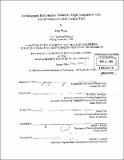An integrated performance model for high temperature gas cooled reactor coated particle fuel
Author(s)
Wang, Jing
DownloadFull printable version (13.11Mb)
Other Contributors
Massachusetts Institute of Technology. Dept. of Nuclear Engineering.
Advisor
Ronald G. Ballinger and Sidney Yip.
Terms of use
Metadata
Show full item recordAbstract
The performance of coated fuel particles is essential for the development and deployment of High Temperature Gas Reactor (HTGR) systems for future power generation. Fuel performance modeling is indispensable for understanding the physical behavior of fuel particles and achieving their high reliability during operations and accidents through a guided design process. This thesis develops an integrated fuel performance model of coated particle fuel to comprehensively study its mechanical behavior and define an optimum fuel design strategy with the aid of the model. Key contributions of the thesis include a pyrocarbon layer crack induced particle failure model with a fracture mechanics approach, mechanical analysis of particles with better representation of irradiation induced creep, a proposed fuel optimization procedure, the capability to simulate arbitrary irradiation histories, and the incorporation of Monte Carlo sampling to account for the statistical variation of particle properties. (cont.) Stress calculations in this model were benchmarked with the FUEL code and finite element calculations of Idaho National Engineering and Environmental Laboratory (INEEL) and with model predictions for High Temperature Test Reactor (HTTR) first- loading fuel. Fuel failure predictions were made for New Production-Modular HTGR irradiated fuel capsules, which show good agreements with experiments. Based on the simulations, it is suggested that in most cases the pyrocarbon crack induced fuel failure mechanism plays a much more important role in fuel performance than the more widely accepted pressure vessel fuel failure mechanism. After the establishment of the model, parametric study was conducted to find out the effects of various input variables on fuel performance, and fuel design and optimization procedure was proposed accordingly. Simulations with optimized fuel configurations demonstrate that superior fuel performance can be achieved with model analysis. The model also prepares interfaces for further improvements on various modules upon arrival of new information.
Description
Thesis (Ph. D.)--Massachusetts Institute of Technology, Dept. of Nuclear Engineering, 2004. Includes bibliographical references (p. 290-300).
Date issued
2004Department
Massachusetts Institute of Technology. Department of Nuclear Engineering; Massachusetts Institute of Technology. Department of Nuclear Science and EngineeringPublisher
Massachusetts Institute of Technology
Keywords
Nuclear Engineering.